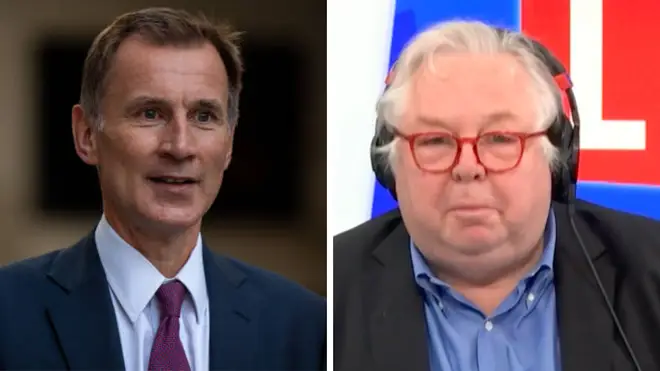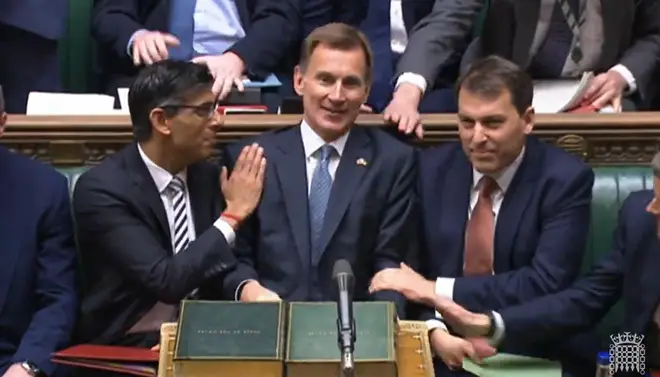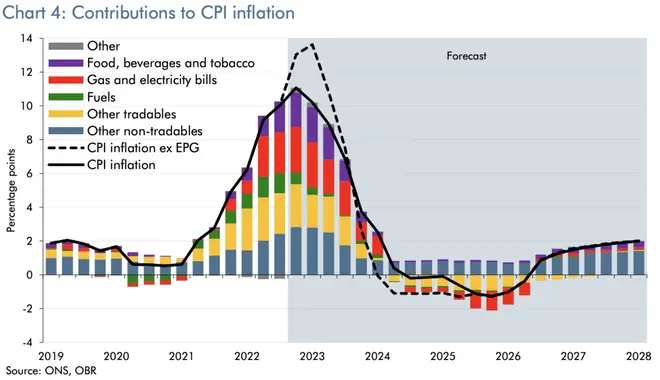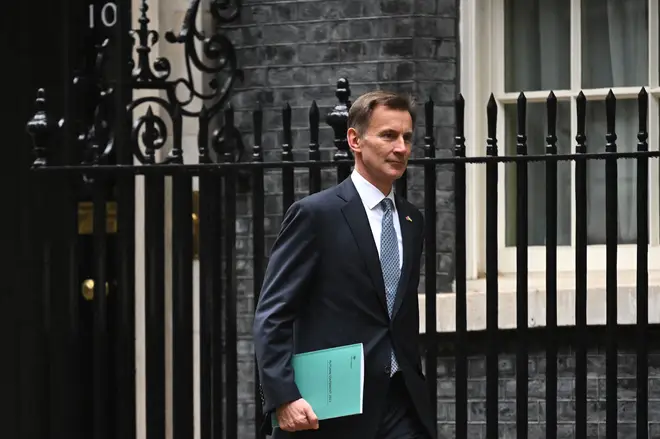
Iain Dale 7pm - 10pm
18 November 2022, 09:29 | Updated: 20 November 2023, 13:38

Jeremy Hunt has insisted that the 'eye-watering' tax rises in the mini-budget on Thursday are the right decision, despite "uncomfortable" headlines.
A total of £55bn in tax rises and spending cuts was confirmed by the chancellor on Thursday, which he said would make the recession quicker and less deep.
Speaking to LBC's Nick Ferrari on Friday, Mr Hunt said that bringing inflation under control was more important to him than criticism in the media.

He said: "People vote Conservative yes because they want low taxes.
"Most of all they Conservative because they want to know that we’re going to look after the economy, look after savings, look after the pound in their pocket."
He added: "This is a very Conservative set of measures. People choose Conservative governments because we face up to difficult decisions."

Referencing Margaret Thatcher who was in a similar position in the 1980s, he said: "They actually put up taxes because we've got to have sound money,.
"It's a very uncomfortable message because we all want lower taxes including me. The truth is sound money matters even more.
He referenced the independent Office for Budget Responsibility, who "said that because of my decisions, inflation will fall further, we will get sound money back sooner - that really matters for [people] who want to see the cost of living brought under control."

He added: "The Conservative thing to do is take difficult decisions - yes that means a lot of uncomfortable headlines but I think people want me to do the right thing.
The chancellor's £25bn in tax rises will come into force in 2023 while £30bn in spending cuts has been put off until the next election.
It leaves Britain facing the highest level of tax since the Second World War - with Labour warning of a "doom loop" in the economy.
British people will suffer the biggest drop in disposable income since the 1950s.
British people's incomes will fall by 7.1% from 2021-22 to 2022-23 on average, which means incomes will be where they were in 2013, according to the Office for Budget Responsibility (OBR), which also said the UK was now in recession.
Real household disposable incomes per person will tumble by 4.3% in 2022-23, the OBR said.
That will be the steepest drop since official records began in 1956-57.
Compounding the pain, that will be followed the very next year by the second largest fall, at 2.8%.
It will be only the third time since 1956-57 that disposable incomes fall two years in a row. The last time was after the financial crisis of 2008.
Simply staggering numbers in OBR report. Real Household Disposable Income per person to fall more than 7% over next two years. Biggest fall on record. Taking incomes down to 2013 levels.
— Paul Johnson (@PJTheEconomist) November 17, 2022
Paul Johnson of the Institute for Fiscal Studies called the figures "simply staggering."
"Real Household Disposable Income per person to fall more than 7% over next two years," he said on Twitter.
"Biggest fall on record. Taking incomes down to 2013 levels."
The drop would have been even sharper if it were not for the government's interventions, including the winter energy price guarantee.
The OBR's comments come in response to Mr Hunt announcing a series of ‘eye-watering’ tax rises and cuts to public spending in an Autumn Statement aimed at plugging the multi-billion pound hole in Britain’s finances.

James O'Brien's instant reaction to Jeremy Hunt's Autumn Statement
Measures include:
But there will be extra money for schools, social care and the NHS. The national living wage for the over-23s will also increase by nearly 10%.
Jeremy Hunt said: “We deliver a plan to tackle the cost of living crisis and rebuild our economy.
“Our priorities are stability, growth and public services.”
He said the financial crisis was an “international one and pledged to respond with “British values.”
“Global factors are the primary cause” of soaring inflation, he added. He said inflation was higher in Germany, the Netherlands and Italy and interest rates were rising faster in other countries.
Follow the latest LIVE on Global player
Live updates: Hunt unveils a brutal package of tax rises and spending cuts

Personal tax thresholds will be maintained at current levels for a 'further 2 years'
He said the world needs to be confident that Britain is able to pay its debts, saying “the United Kingdom will always pay its way.”
He unveiled a package plugging a £55bn black hole in the economy. The Office for Budget responsibility said the UK is now officially in a recession, predicting the economy will shrink by 1.4% next year.
The key measures announced on Thursday were:
In other measures, he announced electric vehicles will no longer be exempt from vehicle excise duty from April 2025 to make the system "fairer”. He said he will scale back support for energy bills from April 2023, and unveiled an increase in the national living wage from the current level of £9.50 for over 23s.
Mr Hunt also said he would be increasing benefits and the state pension in line with inflation.

Hunt announces 9.7% rise in National Living Wage
He also announced an increase in budget for schools and the NHS, saying in 2023 and 2024 the government will invest an extra £2.3bn in schools.
He said there would be a public spending squeeze on all sectors except health - saying the NHS budget will be increased in each of the next two years by £3.3bn.
Mr Hunt said he was delivering a "balanced path to stability" which involves "taking difficult decisions".
The windfall tax on energy firms is expected to raise £14bn alone. The tax on oil and gas firms will increase and will be extended until March 2028 from December 2025.
"I have no objection to windfall taxes if they are genuinely about windfall profits caused by unexpected increases in energy prices," the Chancellor said.
"But any such tax should be temporary, not deter investment and recognise the cyclical nature of many energy businesses. Taking account of this, I have decided that from January 1st until March 2028 we will increase the Energy Profits Levy from 25% to 35%."

Electric vehicle owners will have to pay road tax from 2025, announces Jeremy Hunt
On a windfall tax on electricity generators, he said: "The structure of our energy market also creates windfall profits for low-carbon electricity generation so, from January 1st, we have also decided to introduce a new, temporary 45% levy on electricity generators. Together these taxes raise £14bn next year."
He told MPs: "Anyone who says there are easy answers is not being straight with the British people: some argue for spending cuts, but that would not be compatible with high-quality public services.
"Others say savings should be found by increasing taxes but Conservatives know that high tax economies damage enterprise and erode freedom.
"We want low taxes and sound money. But sound money has to come first because inflation eats away at the pound in people's pockets even more insidiously than taxes.
"So, with just under half of the £55 billion consolidation coming from tax, and just over half from spending, this is a balanced plan for stability."
Speaking later about the impact of the Sunak government on the economy, he claimed: "The overall impact of these changes that we're making is that the recession that we now appear to be in is shallower than it would have been."
Rachel Reeves, the shadow chancellor, said: "The chancellor is saying today he will be honest, so let's be honest - no one was talking about cuts to public spending two months ago and no other advanced economy is cutting spending or increasing taxes on working people as they head into recession.
"This government has forced our economy into a doom loop, where low growth leads to higher taxes, lower investments and squeezed wages, with the running down of public services — all of which hits economic growth again."